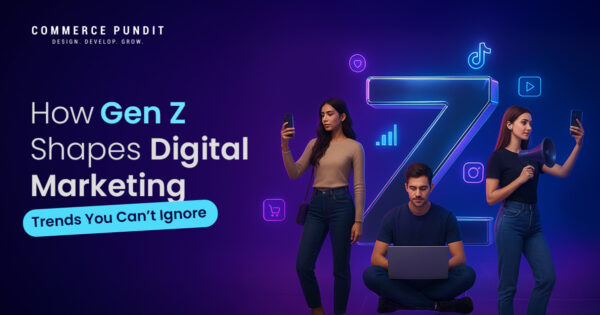Digital Marketing Strategies for Gen Z: Trends for 2025
TL;DR
What Is Digital Marketing for Gen Z?
Digital marketing for Gen Z encompasses the strategies used by brands to engage consumers born between the mid-1990s and early 2010s. This generation is marked by their digital fluency, as they have grown up with technology integrated into their lives. Brands must adapt their marketing strategies to meet Gen Z's preferences, which include authenticity, visually appealing content, and socially responsible messaging.

Image courtesy of Commerce Pundit
Essential platforms for connecting with Gen Z include TikTok, Instagram Reels, and YouTube Shorts, where short-form video content prevails. Influencer marketing and AI-driven personalization are also vital components for effective engagement. Given that Gen Z holds substantial spending power, estimated at $3 trillion, brands must prioritize strategies that resonate with this demographic to remain competitive.
Why Is Gen Z Trending and Why Do People Obsess Over Them?
Gen Z is attracting marketing attention due to their significant cultural and economic influence:
Massive Spending Power and Influence: By 2025, Gen Z is projected to control over $3 trillion in spending. Their preferences drive trends that impact other generations. Learn more about this influence in the Kofluence marketing guide.
Digital Natives Leading Media Consumption: Gen Z's media habits, characterized by 72% of their online time spent on short-form video platforms, signal a shift in marketing approaches. More insights are available in the Gen Z Influencers 2025 Marketing Guide.
Cultural Trendsetters and Creators: This generation is pivotal in shaping trends through memes, viral content, and creator-led initiatives that influence various markets.
Demand for Authenticity and Purpose: Gen Z expects brands to reflect their values, with a NielsenIQ report indicating that commitment to inclusivity and sustainability fosters loyalty. Further insights can be found in Connecting with Gen Z Insights.
Creator Economy and Peer Validation: Brands must engage micro and nano influencers, as 73% of Gen Z discover new brands through these creators, enhancing relatability and reach (Kofluence Gen Z Influencers Guide).
How Has the Style of Shopping Changed Since Gen Z Arrived?
Gen Z's arrival has transformed shopping habits, emphasizing digital-first consumerism:
From Brick and Mortar to Social Media and Mobile: Gen Z prefers mobile shopping, engaging with platforms like Instagram and TikTok where shopping integrates with entertainment.
The Rise of Social Commerce: This generation relies on shoppable posts and influencer recommendations, with projections indicating social commerce revenues will exceed $1 trillion by 2028 (Digital Marketing Trends 2025 | TheeDigital).

Image courtesy of Nice Branding
Instant Gratification and Seamless Experiences: Features like one-click checkout and personalized recommendations are minimum expectations for Gen Z.
Content To Commerce Funnel: Their buying journey starts with discovery on video platforms, followed by peer reviews and ultimately leading to purchases through social shopping features.
Preference for Ethical and Sustainable Shopping: This generation supports brands demonstrating sustainability and corporate responsibility.
Shift Toward Experience Over Ownership: Gen Z values experiences over material ownership, making experiential marketing essential.
How Should the Market Look at Gen Z?
To appeal to Gen Z, businesses must rethink marketing strategies:
1. Prioritize Authenticity and Values
Gen Z favors brands that are genuine and transparent, aligning marketing efforts with their values.
2. Invest Heavily in Social Commerce and Creator Partnerships
Social commerce is becoming the primary storefront for Gen Z. Collaborating with micro and nano influencers helps drive engagement. Explore more in our Influencer Marketing Guide.
3. Embrace AI and Personalization
AI tools facilitate tailored experiences and help brands connect with Gen Z in real time.
4. Optimize for Mobile and Short-Form Content
Creating engaging, snackable content is crucial for capturing Gen Z's attention.
5. Incorporate Voice and Visual Search
Brands should optimize digital presences for voice queries and visual search to meet Gen Z's discovery habits.
6. Build Omnichannel Experiences
An integrated brand journey across various channels enhances satisfaction and retention.
7. Experiment With New Formats and Technologies
Virtual reality and augmented reality can make shopping experiences more immersive and engaging for Gen Z.
Key Digital Marketing Trends for Gen Z in 2025
Artificial Intelligence Enables Hyper-Personalization: Brands using AI can offer customized content and predictive analytics for trend spotting.
Search Everywhere: Multi-Platform Optimization: Gen Z searches beyond traditional search engines. Brands should create viral-friendly short videos and optimize their presence on social media platforms.
Voice and Visual Search Growth: Brands need to optimize for voice queries and invest in visual search.
Social Commerce and Livestream Shopping: Consumers are increasingly purchasing directly within social apps.
Influencer and Creator Economy: Investing in micro-influencers yields higher engagement and conversion rates.
Upholding Authenticity and Values: Brands should demonstrate inclusivity and sustainability in their marketing efforts.
Content That Educates and Entertains: Gen Z appreciates valuable content that builds community.
Omnichannel Presence with AI Automation: A unified marketing journey powered by AI can enhance brand engagement.
For further learning, explore our detailed strategies on the ecommerce SEO best practices to strengthen your multi-platform digital strategies.





